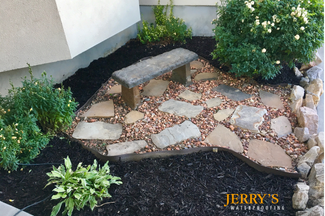A fresh layer of mulch can make your landscaping look cleaner and help soil stay healthy, but too much of it placed too close to your home can create moisture problems around your foundation. Many homeowners never connect the two, because mulch seems harmless. In reality, it can hold water against your foundation walls and increase the risk of basement or crawl space issues.
If your home has musty odors, damp walls, or occasional water intrusion, mulch could be contributing in ways you haven’t noticed.

How Mulch Holds Moisture Near Your Foundation
Mulch is designed to retain moisture, but that same benefit becomes a problem when it sits against the structure of your home.
Here’s how it creates moisture trouble:
- It acts like a sponge and absorbs rain and sprinkler water.
- It slows evaporation, keeping the soil beneath it wet longer.
- Moisture pushes against the foundation, increasing hydrostatic pressure.
- Decay in organic mulch generates humidity, which can seep into basements and crawl spaces.
Even if your basement looks dry, this constant moisture can weaken concrete over time, contribute to mold growth, and increase indoor humidity.
Common Foundation Issues Linked to Mulch
These are some of the problems Jerry’s Waterproofing sees that can be aggravated by mulch”
| Issue | How Mulch Makes It Worse |
| Basement wall leaks | Moisture sits against exterior foundation walls |
| Moldy basement smell | Organic mulch + warm soil = high humidity |
| Efflorescence | Moisture pulls minerals through concrete walls |
| Foundation settlement | Overly saturated soil becomes soft and unstable |
| Insect intrusion | Mulch attracts termites, ants, and wood-boring insects |
Mulch is not always the root cause, but it can stack on top of drainage problems and magnify them.
Warning Signs Mulch Might Be Part of the Problem
You may not associate these symptoms with landscaping, but they’re often connected:
- Mulch is stacked higher than the foundation or siding.
- You see water pooling after rain near mulched beds.
- Your basement smells musty, even without visible water.
- Paint is bubbling on interior foundation walls.
- The mulch bed sits in an area with poor gutter drainage.
How to Mulch Safely Around Your Home
Keeping mulch away from your foundation doesn’t mean getting rid of it. These steps help prevent moisture issues:
Maintain a Safe Clearance
Keep mulch at least 6 inches below your siding and 3–6 inches away from the foundation wall.
Spread Mulch Thinly
Two to three inches is usually enough. Deep mulch beds hold more water than most homeowners realize.
Choose Better Materials
Stone or rubber mulch retains far less moisture than organic mulch.
Watch Your Irrigation System
Sprinklers should not spray directly onto the foundation or into mulch beds.
Ensure Proper Drainage
Downspouts should extend 4–6 feet away from the home and soil should slope away from the foundation.
When Mulch Is a Sign of a Bigger Problem
If you’re already dealing with:
- damp basement walls
- water leaking through floor or wall cracks
- a wet or humid crawl space
- visible mold or musty air
- foundation settlement or cracking
mulch might be contributing, but drainage or foundation issues are likely also at play. Jerry’s Waterproofing can inspect the situation and recommend the right solution, whether that’s grading improvements, sump pump installation, interior or exterior drainage, wall repair, or crawl space encapsulation.
Protect Your Home from Moisture Damage
Mulch looks great, but it needs to be used wisely around your foundation. A few small landscaping changes can prevent moisture from building against your home and help you avoid serious basement or crawl space problems in the future.
If you’re noticing signs of moisture, don’t wait for it to get worse. Jerry’s Waterproofing serves homeowners across Eastern Nebraska and Western Iowa with expert waterproofing and foundation repair solutions.
Contact us today for an inspection and keep your home protected from the ground up.



